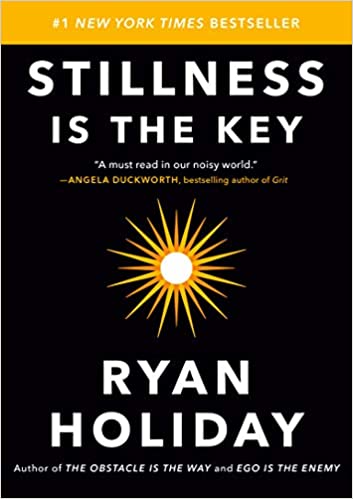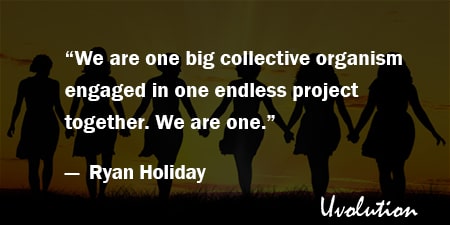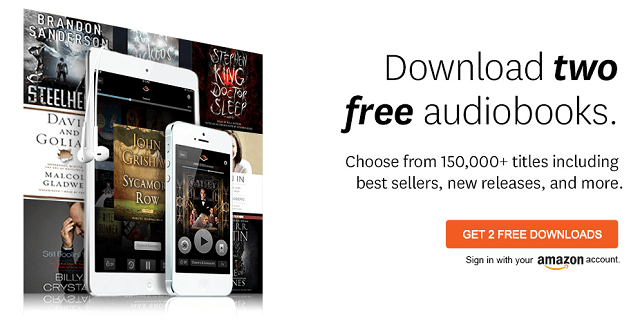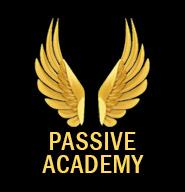Stillness is The Key by Ryan Holiday Summary
The Book in 1 Sentences
“It wouldn’t have mattered whether you were a pupil at the feet of Confucius in 500 BC, a student of the early Greek philosopher Democritus one hundred years later, or sitting in Epicurus’s garden a generation after that—you would have heard equally emphatic calls for this imperturbability, unruffledness, and tranquility.
The Buddhist word for it was upekkha. The Muslims spoke of aslama. The Hebrews, hishtavut. The second book of the Bhagavad Gita, the epic poem of the warrior Arjuna, speaks of samatvam, an ‘evenness of mind—a peace that is ever the same.’ The Greeks, euthymia and hesychia. The Epicureans, ataraxia. The Christians, aequanimitas.
In English: stillness.
To be steady while the world spins around you. To act without frenzy. To hear only what needs to be heard. To possess quietude—exterior and interior—on command. To tap into the dao and the logos. The Word. The Way.
Buddhism. Stoicism. Epicureanism. Christianity. Hinduism. It’s all but impossible to find a philosophical school or religion that does not venerate this inner peace—this stillness—as the highest good and as the key to elite performance and a happy life.
And when basically all the wisdom of the ancient world agrees on something, only a fool would decline to listen.” ~ Ryan Holiday
5 BIG Ideas
Stillness Is the Key Book Summary
1. Stillness Is the Key for Everything
“‘Vicksburg is the key,’ he [Lincoln] told the crowd with the certainty of a man who had studied the matter so intensely that he could express it in the simplest of terms. ‘The war can never be
brought to a close until that key is in our pocket.’
As it happened, Lincoln turned out to be exactly right. It would take years, it would take incredible equanimity and patience, as well as ferocious commitment to his cause, but the strategy laid out in that room was what won the war and ended slavery in America forever. ...
In his reflective, intuitive manner, without being rushed or distracted, Lincoln had seen (and held fast to) what his own advisors, and even his enemy, had missed. Because he possessed the key that unlocked victory from the rancor and folly of all those early competing plans.
In our own lives, we face a seemingly equal number of problems and are pulled in countless
directions by competing priorities and beliefs. In the way of everything we hope to accomplish , personally and professionally, sit obstacles and enemies.
Martin Luther King Jr. observed that there was a violent civil war raging within each and every person—between our good and bad impulses, between our ambitions and our principles, between what we can be and how hard it is to actually get there.
In those battles, in that war, stillness is the river and the railroad junction through which so
much depends. It is the key . . .
Stillness is the key to, well, just about everything.
To being a better parent, a better artist, a better investor, a better athlete, a better scientist, a
better human being. To unlocking all that we are capable of in this life.”
“The premise of this book is that the three domains—the mind, the heart, and the body—must be in harmony. The truth is that for most people not only are these domains out of sync, but they are at war with each other. We will never have peace until that civil war Dr. King described is settled.
History teaches us that peace is what provides the opportunity to build. It is the postwar boom that turns nations into superpowers, and ordinary people into powerhouses.”
“Remember, there’s no greatness in the future. Or clarity. Or insight. Or happiness. Or peace. There is only this moment.”
2. Limit Your Inputs
“It is in this stillness that we can be present and finally see truth. It is in this stillness that we can hear the voice inside us.
How different would the world look if people spent as much time listening to their conscience as they did to chattering broadcasts? If they could respond to the calls of their convictions as quickly as we answer the dings and rings of technology in our pockets.
All this noise. All this information. All these inputs.
We are afraid of the silence. We are afraid of looking stupid. We are afraid of missing out. We are afraid of being the bad guy who says, ‘Nope, not interested.’
We’d rather make ourselves miserable than make ourselves a priority, than be our best selves. Than be still . . . and in charge of our own information diet.”
“That space between your ears—that’s yours. You don’t just have to control what gets in, you also have to control what goes on in there. You have to protect it from yourself, from your
own thoughts. Not with sheer force, but rather with a kind of gentle, persistent sweeping. Be the librarian who says, ‘Shhh!’ to the rowdy kids, or tells the jerk on his phone to please take it
outside. Because the mind is an important and sacred place. Keep it clean and clear."
“If solitude is the school of genius, as the historian Edward Gibbon put it, then the crowded, busy world is the purgatory of the idiot.”
3. Journaling is a 'spiritual windshield wipers'
“Anne [Frank] used her journal to reflect: ‘How noble and good everyone could be’ she wrote, ‘if at the end of the day they were to review their own behavior and weigh up the rights and wrongs. They would automatically try to do better at the start of each new day, and after a while, would certainly accomplish a great deal.’ ...
That is what journaling is all about. It’s spiritual windshield wipers, as the writer Julia Cameron once put it. It’s a few minutes reflection that both demands and creates stillness. It’s a break from the world. A framework for the day ahead. A coping mechanism for troubles of the hours just past. A revving up of your creative juices, for relaxing and clearing.
Once, twice, three times a day. Whatever. Find what works for you.
Just know that it may turn out to be the most important thing you do all day.”
“To have an impulse and to resist it, to sit with it and examine it, to let it pass by like a bad smell—this is how we develop spiritual strength. This is how we become who we want to be in this world.”
4. Living with Virtue
“Marcus Aurelius famously described a number of what he called ‘epithets for the self.’ Among his were: Upright. Modest. Straightforward. Sane. Cooperative. These were, then, the traits that served him well as emperor.
There are many other traits that could be added to this list: Honest. Patient. Caring. Kind. Brave. Calm. Firm. Generous. Forgiving. Righteous.
There is one word, however, under which all these epithets sit: virtue.
Virtue, the Stoics believed, was the highest good—the summum bonum—and should be the
principle behind all our actions. Virtue is not holiness, but rather moral and civic excellence in
the course of daily life. It’s a sense of pure rightness that emerges from our souls and is made
real through the actions that we take.
The East prized virtue as much as the West. The Daodejing, for instance, actually translated as The Way of Virtue. Confucius, who advised many of the rulers and princes of his day, would
have agreed with Marcus that a leader was well served by the pursuit of virtue.
His highest compliment would have been to call a ruler a junzi—a word that translators still have trouble finding equivalents for in English but is roughly understood as a person who emanates integrity, honor, and self-control.”
“Each of us must cultivate a moral code, a higher standard that we love almost more than life itself. Each of us must sit down and ask: What’s important to me? What would I rather die than betray? How am I going to live today?
These are not idle questions or the banal queries of a personality quiz. We must have the
answers if we want the stillness (and the strength) that emerges from the citadel of our own
virtue.”
“The essence of greatness is the perception that virtue is enough.”
“There is no stillness for the person who cannot appreciate things as they are, particularly when that person has objectively done so much.
The creep of more, more, more is like a hydra. Satisfy one—lop it off the bucket list—and two more grow in its place.”
5. The Domain of the Body
“As Paul Johnson, one of Churchill’s best biographers, would write, ‘The balance he maintained between flat-out work and creative and restorative leisure is worth study by anyone holding a top position.’
Johnson as a seventeen-year-old, decades before his own career as a writer, met Churchill on the street and shouted at him, ‘Sir, to what do you attribute your success in life?’ Immediately, Churchill replied, ‘Conservation of energy. Never stand up when you can sit down, and never sit down when you can lie down.’
Churchill conserved his energy so that he never shirked from a task or backed down from a
challenge. So that, for all this work and pushing, he never burned himself out or snuffed out
that spark of joy that made life worth living.
(Indeed, in addition to the importance of hard work, Johnson said the other four lessons from Churchill’s remarkable life were to aim high; to never allow mistakes or criticism to get you down; to waste no energy on grudges, duplicity, or infighting; and to make room for joy.)
Even during the war, Churchill never lost his sense of humor, never lost sight of what was beautiful in the world, and never became jaded or cynical.”
“Life is hard. Fortune is fickle. We can’t afford to be weak. We can’t afford to be fragile. We must strengthen our bodies as the physical vessel for our minds and spirit, subject to the capriciousness of the physical world.”
That was my QUICK summary of the great book Stillness is The Key by Ryan Holiday. If you’re interested, get your copy. There is a HUGE amount of life-changing ideas in this book, and we’ve only touched on a tiny bit of it.
Buy The Book: Stillness is The Key by Ryan Holiday

GET Blinkist 7 Days FREE Trial
3000+ Book Summaries
(Audio and Text)








